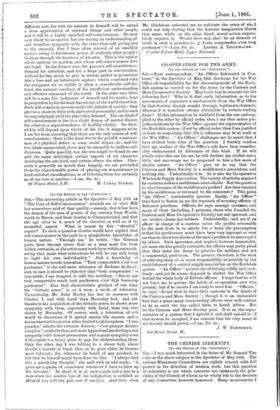[TO THE EDITOR OF THE "SPECTATOR?]
Sin,—The interesting article in the Spectator of May 25th on The Uses of Self-Consciousness" reminds me of what Mill has somewhere said of that quality,—namely, that it has been the demon of the men of genius of the century from Words- worth to Byron, and from Goethe to Chateaubriand, and that the age owes to it much of its cheerful, as well as of its mournful, aspect. What is meant by this " cheerful " aspect ? To such a question Goethe would have replied that self-consciousness is the path to a sympathetic knowledge of human nature. "Through me," he writes, "the German poets have become aware that, as a man must live from within outwards, so the artist must work from within outwards, seeing that, make what contortions he will, he can only bring to light his own individuality." And a knowledge of human nature breeds toleration. "Tout comprendre, c'est tout pardonner " is the well-worn utterance of Madame de Stael ; and, in case it should be objected that "tout comprendre" is impossible, I am tempted to add the corollary: " Savoir que tout comprendre serait tout pardonner, c'est dejl beaucoup pardonner." Also that characteristic product of our time, the "historic sense," is, as it were, a mode of toleration. Theoretically, Mr. John Morley has less in common with Charles I. and with Laud than Macaulay had; and yet, thanks to his acquisition of the historic sense, he shows more sympathy with them, especially with Laud, than was ever shown by Macaulay. Of course, such a toleration of evil would be disastrous if it spread among the masses, and is not an unmixed boon even when limited to philosophers. " Com. prendre," admits the virtuous Scherer, "c'est presque devenir compl ice "; and to be thus, as it were, hypnotised into feeling areal sympathy with honest persecutors and a quasi-sympathy even with rogues is a heavy price to pay for understanding them. Only the other day I was talking to a clever lady about Goethe's lament or boast that, as he grew older, he became more tolerant; for, whenever he heard of any misdeed, he felt that he himself might have done the like. "I always find this a paralysing thought," she said with an odd smile; "it gives me a qualm of conscience whenever I have to blow up the servants." In short, it is at once a gain and a loss to a man when the sombre hue of his indignation is sicklied or silvered o'er with the pale cast of analysis. And thus, when
Mr. Gladstone exhorted me to cultivate the sense of sin, 1 could not help feeling that the historic imagination blunts that sense, while, on the other hand, moral action impera- tively requires it. Would there not, alas! be an element of truth in such a paradox as : Assez comprendre, c'est trop






































 Previous page
Previous page